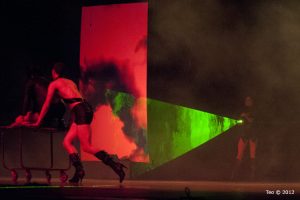Lux Boreal Offers Dark, Provocative Dance at SD Fringe
 Although Lux Boreal’s Tijuana home makes it a local dance company, the troupe performs internationally, making the rounds of Latin American festivals and touring to Spain, Australia, Ireland, and, last month, France. In performances here, Lux Boreal has become known for complex, smart work and technically stunning dancers. All of that makes the company’s appearance at the San Diego Fringe Fest a very hot ticket.
Although Lux Boreal’s Tijuana home makes it a local dance company, the troupe performs internationally, making the rounds of Latin American festivals and touring to Spain, Australia, Ireland, and, last month, France. In performances here, Lux Boreal has become known for complex, smart work and technically stunning dancers. All of that makes the company’s appearance at the San Diego Fringe Fest a very hot ticket.
Very hot and very bleak. Lux Boreal directors Angel Arambula and Henry Torres have created dark work in the past, but even in hard-hitting pieces like one about narco-trafficking, there are usually touches of absurdist fun. The humor is sparse, however, in the two dances on the company’s Fringe program, which I saw on Friday. These hard-danced works display much of what’s best about Lux Boreal – artistic depth and the dancers’ extraordinary connection with one another – but the bleakness had me worried. Angel and Henry, are you guys okay?
The lightest things about Torres’ piece are the title, “I’m from there, indeed, however I don’t like tomatoes” (a direct translation from the original Spanish) and a bit near the end when Raul Navarro comes out in a blue evening dress and lip syncs to a romantic ballad – the kind of thing Fred Astaire and Ginger Rogers would have danced to – facing a video of a blue sky with puffy clouds. Most of “Tomatoes,” however, is like a Fellini fantasy, except with only the kinky bits and none of the playful delight. Two men (Matthew Armstrong, Octavio Dagnino) in tight black dominator garb manipulate Arambula, who appears to be in a trance. A dominatrix (Victoria Reyes) sometimes tries to protect Arambula, at one point cradling him in a Pietà pose. But Reyes is no Madonna. Joining the dominators in dramas of control, she counts out loud, and they take that many steps. Later she strides triumphantly as she zaps Armstrong with a green death ray. When the men are in power, they strip off Reyes’ stiletto-heeled boots, put a hood over her head, and joylessly straddle her. After dressing Arambula in duds like theirs, they crush tomatoes against his chest. (Mauricio Ascencio did the shiny costumes.)
The domination theme, the tomatoes, and video of a barbed wire fence made me see this piece in part as an allegory about the relationship between agricultural Mexico and the U.S. But “Tomatoes” also plays with gender and with a general sense of dissoluteness: The men mush on lipstick that messily circles their mouths and wear stiletto-heeled boots like Reyes’. And, in the best flat-out dancing, Reyes and then Dagnino do spinning, leaping solos to that totemic song about hedonism, the Eagles’ “Hotel California.” Phew!
Dagnino, recipient of a Young Creator award, and Arambula collaborated on “QR Move.” The title suggests a chest match, and the six dancers begin by walking as if on a vertical-horizontal grid. Wearing gray business suits and with frozen expressions, at first they move in a pack like exhausted commuters forced to share space but hoping to ignore one another at the end of a mind-numbing day. Gradually, one person or another breaks out. Then the walks become runs, two dancers and then two others collide, and the faceoffs turn into nimble bits of contact improvisation. Finally, they fall in a pile, exhausted, but pull themselves up and cluster again, and what looks like white sand (it’s sugar) falls from the ceiling onto their heads – a striking image, though I’ve seen it done far more powerfully by Cloud Gate Dance Theatre. What’s most exciting in this dance is the coordination as all six dancers stride quickly past one another. In a number of Lux Boreal’s pieces, the dancers function as if they have a common nervous system. It’s remarkable and wonderful, and it happens here.
I did miss the Lopez sisters, Azalea and Briseida, both of whom are on maternity leave. Briseida is the troupe’s most delicately feminine presence, and Azalea is a wise clown, able to be silly without undermining a piece’s essential seriousness, and perhaps it was their absence that made this program so grim.
